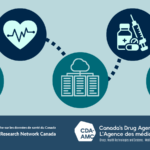Roadmap to better rare disease decision-making through data linkage


With the support of HDRN Canada and ICES, Canada’s Drug Agency (CDA) has released a new tool to help teams that manage patient and disease registries navigate the process of linking registry data to administrative health services data. CDA is an independent, not-for-profit organization responsible for providing policymakers with evidence to make informed decisions about the use of drugs and medical devices.
A Roadmap for Patient and Disease Registries: Linking Health Data to Enhance Rare Disease Decision-Making was designed for teams that manage patient and disease registries, based at research institutes or hospitals. Its goal is to create a more comprehensive understanding of rare diseases and contribute to the body of evidence that supports decision-making around health care provision in Canada. To do that, the roadmap includes a guide to better prepare registry teams for data linkage with administrative health services data, as well as an outline of considerations for developing registry participant consent forms.
Linking data from patient and disease registries with administrative health services data can help create a better view of how a disease can impact someone’s life and contribute to evidence-based decision making by health policymakers. ~ Dr. Kim McGrail
Patient and disease registries collect standardized data about patients with a specific disease or condition, which can be used to describe the history of a disease and assess health care interventions, costs and quality of care. Administrative data include information collected through a patient’s routine encounters with the health care system. CDA’s roadmap helps prepare and guide researchers and data registry teams through the data linkage process.
“Linking data from patient and disease registries with administrative health services data can help create a better view of how a disease can impact someone’s life and contribute to evidence-based decision making by health policymakers,” said HDRN Canada CEO Dr. Kim McGrail.
“There is incredible value in this type of data linkage,” Dr. McGrail continued. “But the process can be complex and things like privacy legislation and ethical considerations can be really challenging to navigate. That’s why it was important for us to work with Canada’s Drug Agency on this initiative to better support registry teams to prepare for and execute the data linkage process.”
